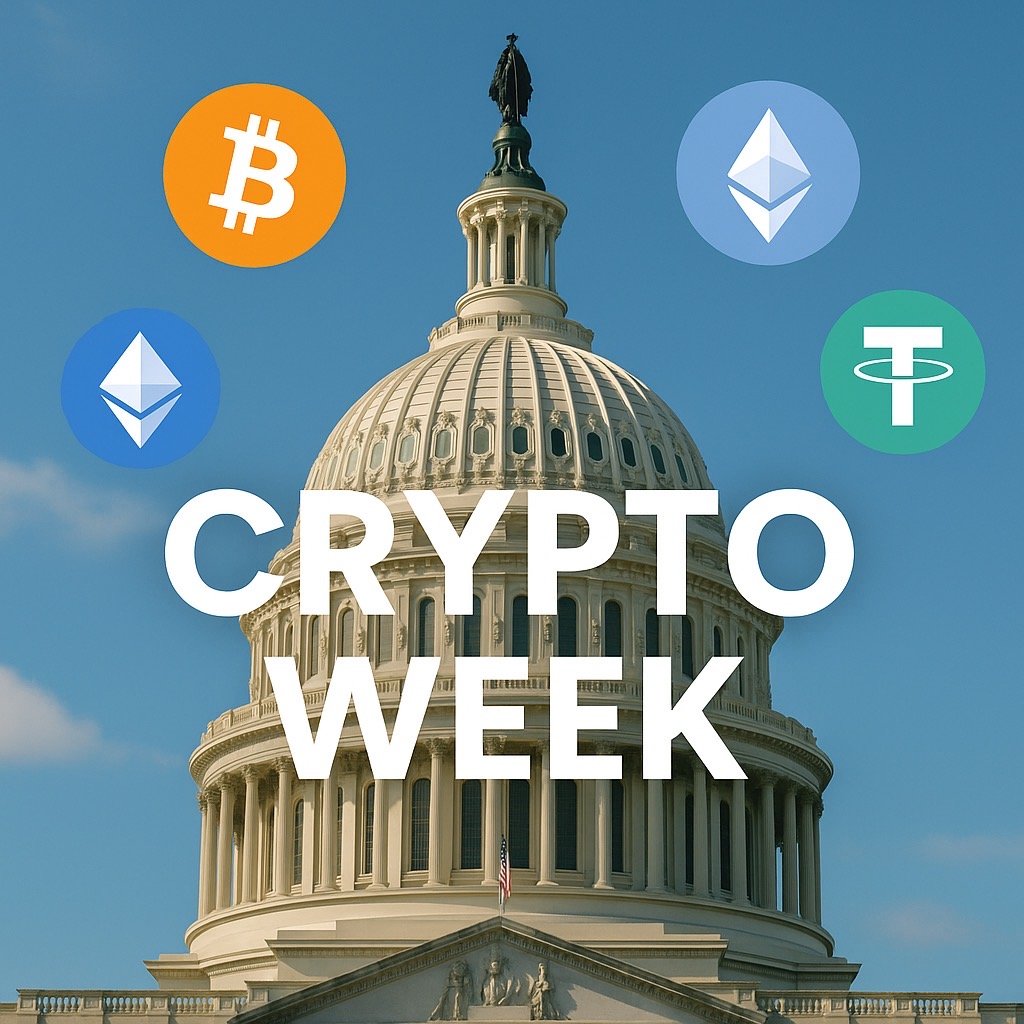From July 14 to 18, 2025, Washington, D.C. will host a landmark moment in cryptocurrency policy: Crypto Week.
During this five-day window, the U.S. House of Representatives is expected to vote on several high-profile bills that could reshape the regulatory framework for digital assets in the United States.
While the legislative focus is on defining oversight and setting standards, these developments also raise practical questions for everyday crypto users — especially around how and where digital assets should be held.
What Is Crypto Week?
“Crypto Week” refers to a scheduled legislative push centered on three major crypto-related bills:
- The CLARITY Act aims to define which federal agencies regulate different kinds of crypto assets — giving the Commodity Futures Trading Commission (CFTC) oversight of decentralized digital commodities while reserving the Securities and Exchange Commission (SEC) for tokens with investment-contract characteristics.
- The Anti-CBDC Surveillance State Act proposes a ban on the creation of a U.S. Central Bank Digital Currency (CBDC), reflecting concerns over privacy, data collection, and financial control.
- The GENIUS Act, recently passed in the Senate, sets federal standards for stablecoin issuers, including full reserve backing and regular audits.
These bills are the product of years of debate over how to balance innovation, investor protection, and financial stability in the crypto sector.
If passed, they could bring more structure to a space long marked by regulatory uncertainty.
The Regulatory Shift and the Case for Wallet Control
For institutions and exchanges, these bills could impose new compliance requirements and reporting obligations.
But for individual users, Crypto Week raises important questions about ownership, access, and control.
A key theme running through the week is centralization vs decentralization — particularly when it comes to who holds your digital assets and under what terms.
These proposals reflect an ongoing debate about how digital assets should be governed — whether through centralized oversight by institutions or decentralized control by individual users.
The Ongoing Relevance of Self-Custody Wallets
As regulations evolve, self-custody wallets remain a consistent way for individuals to retain full control over their crypto holdings.
These wallets — where the user holds their own private keys — aren’t directly affected by changes to exchange rules or stablecoin frameworks.
Benefits of self-custody include:
- Greater independence from institutional risks or regulatory changes affecting centralized platforms.
- Enhanced privacy, especially in light of surveillance concerns tied to CBDCs.
- Long-term resilience, since access to funds isn’t so reliant on third-party infrastructure.
Crypto Week won’t ban centralized exchanges or custodial services, but it highlights the importance of self-custody at a time when control over digital assets is increasingly being defined by regulation.
Why Now Might Be the Time for Self-Custody
With U.S. lawmakers preparing to vote on major crypto legislation, now is a good time to reassess how you store your digital assets.
Regulatory clarity may bring benefits, but it could also lead to stricter oversight of exchanges and custodial platforms. Taking control of your crypto through self-custody can offer more independence and resilience in the face of change.
As the regulatory environment evolves, there are a few practical steps crypto users can take to stay ahead:
Stay updated on proposals like the CLARITY Act, Anti-CBDC Act, and GENIUS Act. Understanding these policies helps you anticipate how they could affect wallets, exchanges, and stablecoins.
- Explore self-custody solutions
Consider using hardware wallets or open-source software that lets you hold your own private keys. These tools give you direct control over your assets, independent of regulated third-party platforms.
- Strengthen your security practices
Back up your recovery phrases offline, enable multi-factor authentication where possible, and follow current best practices for wallet security.
Crypto Week at the Capitol may be a pivotal moment for the digital asset industry. Whether it brings sweeping changes or incremental progress, it signals that crypto is now firmly on the U.S. policy agenda.
For users, that’s a cue to stay engaged — and consider how self-custody can remain a stable foundation, even in times of regulatory transition.
Best Self-Custody Solutions to Store Your Digital Assets
As whales and retail investors gravitate towards self-custody to maintain full control of their assets, one major brand that springs to mind is Best Wallet.
A non-custodial, multichain wallet, Best Wallet gives users complete ownership of their private keys and digital assets without sacrificing ease of use and privacy. This means no third-party, not even the wallet team, can have access to their wallets and funds.
It also adopts a no-KYC policy, allowing users to store, buy, and trade their assets without any KYC or government identification. This explains its soaring popularity among crypto enthusiasts who value their privacy above all else.
Security comes through Fireblocks, a cutting-edge tool integrated to ensure full insurance of crypto assets held in its facility and protect users from theft, hacks, scams, and phishing attempts, all without requiring their data.
Best Wallet also sets itself apart by offering advanced features, beyond basic wallet capabilities, rarely seen in crypto wallets, including a token launchpad, derivatives trading, a staking aggregator, iGaming perks, cross-chain swaps, MEV protection, and gas token-free transactions.
The token launchpad is particularly unique as it enables users to access all relevant information about new crypto assets and invest in them without leaving the app.
Together, these standout features strategically position Best Wallet for significant adoption, especially as investors rethink how they store their digital assets amid growing regulatory scrutiny.
Download Best Wallet
This article has been provided by one of our commercial partners and does not reflect Cryptonomist’s opinion. Please be aware our commercial partners may use affiliate programs to generate revenues through the links on this article.
